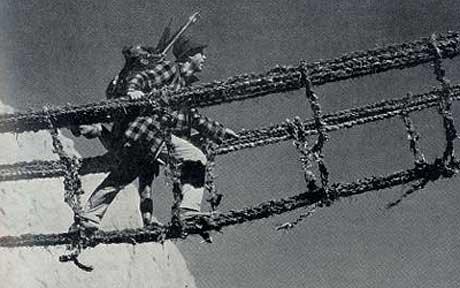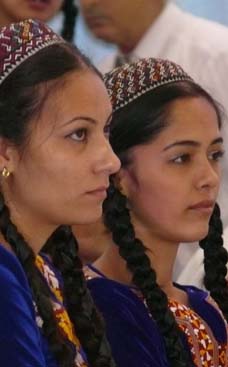
Charles Snead Houston was born in 1913 in New York and began climbing at age 12, first in the Alps and later in Alaska. He graduated from Harvard College and received a medical degree from Columbia University. While in medical school in 1936, he was the first to top the Nanda Devi in India, then the world's highest ascent. In 1938, he led another climbing party on a reconnaissance of K2, reaching 26,000 feet before time and food ran out.
India Country Director Charles S. Houston Blazed Trails On Mountains, in Care
Doctor Blazed Trails On Mountains, in Care
By Patricia Sullivan
Washington Post Staff Writer
Saturday, October 3, 2009
Caption: Charles Houston crossing a rope bridge on his way up K2
Charles S. Houston, 96, who pioneered the field of high-altitude medicine after an expedition up the world's second-highest mountain claimed the life of a fellow mountaineer, died Sept. 27 at his home in Burlington, Vt. No cause of death was reported.
In 1953, Dr. Houston, an experienced alpinist, led a team of eight climbers almost to the top of the 28,251-foot Himalayan peak of K2. On its icy slopes just 3,000 feet below the summit, Dr. Houston and his party stalled after a blizzard set in and raged for two weeks. During the wait for better weather, geologist Art Gilkey developed phlebitis in a leg, resulting in such bad swelling that he was unable to continue.
Dr. Houston, who had begun studying high-altitude physiology, thought it likely that a fatal blood clot would reach his lungs. The healthy members of the team, knowing they faced an almost-impossible task of saving Gilkey, nonetheless wrapped him in his sleeping bag and tent and lowered him down the mountain, inch by inch.
But one man slipped, and the team, tied together, fell. Only because the youngest member of the party anchored his ice ax in time did they all avoid certain death. It took an hour for the climbers to recover their ground, but when they reached Gilkey's position, he was gone, presumably swept to his death by sliding snow.
Dr. Houston wrote movingly of Gilkey's life and death in "K2: The Savage Mountain" (1954), which has become a classic in mountaineering literature, and he carried guilt over the episode for many years thereafter.
As a result, Dr. Houston (pronounced HOW-stun) gave up mountaineering and devoted himself to the medical dangers faced by climbers. Four years later, while treating a sick skier in Aspen, Colo., Dr. Houston was the first to document high-altitude pulmonary edema, a buildup of fluid in the lungs, one of a complex of potentially fatal illnesses that beset alpinists.
ad_icon
A decade later, he was the first to identify high-altitude retinal hemorrhages, which were similar to a condition sometimes found in newborns. In 1975, he launched the Mountain Medicine Symposium, which became the International Hypoxia Symposium, the premier venue for high-altitude medical studies, in which he stayed involved almost to the end of his life.
He also helped found the medical branch of the Peace Corps after serving as the Peace Corps' first country director in India.
Charles Snead Houston was born in 1913 in New York and began climbing at age 12, first in the Alps and later in Alaska. He graduated from Harvard College and received a medical degree from Columbia University. While in medical school in 1936, he was the first to top the Nanda Devi in India, then the world's highest ascent. In 1938, he led another climbing party on a reconnaissance of K2, reaching 26,000 feet before time and food ran out.
"I felt that all my previous life had reached a climax in these last hours of intense struggle," he later wrote.
During World War II, Dr. Houston served in the Navy, doing research and training that helped tens of thousands of American pilots survive low-oxygen conditions to fly above German and Japanese fighters. In 1947, he directed a 34-day study known as "Operation Everest," which proved that men could gradually adjust to work in situations of low oxygen. He also was the principal investigator in 1985 when the study was updated.
"One of his closest friends was [former Defense Secretary] Bob McNamara, and before his death, he said Charlie's work changed military strategy, as well as medicine, forever," said broadcaster Bill Moyers, who was a friend of Dr. Houston's since recruiting him to the Peace Corps. "His work in the high-altitude field, I think, will stand as a tribute to him for all time to come."
Moyers, who interviewed Dr. Houston in 2004, plans to rebroadcast that program Friday on his PBS show.
After World War II, Dr. Houston returned to the Himalayas, blazing most of the trail on the south face of Everest that Edmund Hillary and Tenzing Norgay completed in 1953, the year of Dr. Houston's harrowing episode on K2.
"While he had a strong ego, he was not reckless," Moyers said. "On that climb, they stopped short of the peak because he felt it was too dangerous." He told Moyers that he climbed because "I wanted to go where no one else had been."
Dr. Houston practiced internal medicine in Exeter, N.H., Aspen and Burlington. In the basement of his Colorado home in the late 1950s, he built an experimental artificial heart, which he implanted in a dog. He left that field to others and focused on altitude studies. He taught at the University of Vermont from 1966 to 1979. His "Going Higher: Oxygen, Man and Mountains" (1980) has gone through multiple editions.
In his 90s, suffering from macular degeneration, he worked with filmmakers to make digital copies of his 1938 and 1953 K2 expeditions for the documentary "The Brotherhood of the Rope," which became the title of his biography by Bernadette McDonald. He also spoke out on health-care reform, writing to his local newspaper two months ago that part of the cause of higher health-care costs was the greediness of physicians.
One of his sons, Dr. Robin Houston of Bozeman, Mont., said his father was "an exceedingly good clinician . . . who practiced medicine the old-fashioned way. He taught others how to touch patients and his way of listening to them."
His wife, Dorcas Tiemeyer Houston, died in 1999.
Survivors, in addition to his physician son, include two children, David Houston of Burlington and Penny Barron of San Diego; six grandchildren; and two great-granddaughters.












